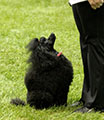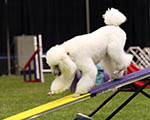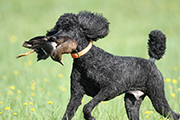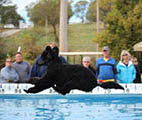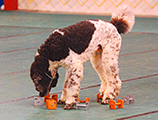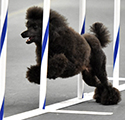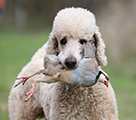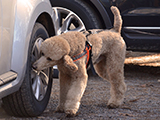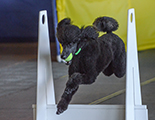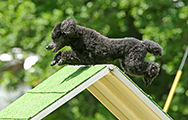Fact Sheet
BLOAT OR GASTRIC DILATION (TORSION) AND VOLVULUS (GDV)
Standard
The stomach fills rapidly with air and can twist, which causes the blood supply to the stomach and spleen to be cut off. This is a life threatening disorder requiring immediate and aggressive veterinary intervention.
Abdominal swelling, non-productive vomiting, restlessness, panting, salivation, shallow breathing, progressing to shock and death.
Unknown, although there is a strong familial tendency in the Standard Poodle.
X-ray or clinical examination.
Varies, although it is more common in older dogs.
Dogs often bloat at night, so know where the nearest emergency clinic is and keep the phone number handy. If you think your dog may be bloating, call the clinic to let them know you are on your way. Do not hesitate. Bloat can be fatal if left undiagnosed and untreated.
The veterinarian may insert a tube into the dog’s stomach to extract the air. In some cases emergency surgery may be required to return the stomach to its normal position and repair any damage caused by the bloat. A dog that has bloated once is likely to bloat again, so surgery to tack the stomach to a rib or the abdominal wall (gastropexy) in order to prevent the stomach from twisting is recommended. If emergency surgery was not necessary, a gastropexy may be done as soon as the dog has been stabilized. In recent years, surgeons have developed a laparoscopic gastropexy, which reduces the recuperation time since only two small incisions are needed.
No dog that has had surgery for bloat should be bred. A dog that produces offspring who develop bloat should be considered a carrier. Great care should be taken not to breed carrier to carrier.
There are many theories as to why dogs bloat but as of this writing, there are no definitive answers. A 5-year prospective study and epidemiological studies have identified no dietary factors that can clearly prevent bloating, but they identified some factors that were associated with relatively lower bloating incidences. You can take some simple steps that may prevent your dog from bloating. These steps include:
- Do not use a raised food bowl.
- Divide the dog’s food into two or more meals each day.
- After vigorous exercise, allow the dog to rest for an hour before feeding.
- Do not allow the dog to drink large amounts of water immediately after eating.
- Avoid feeding dry foods containing oils or fats being listed as any of the first four ingredients.
Studies at Purdue University suggest that dogs with deep, narrow chests are at greater risk. Fearful dogs or dogs who are under stress (being kenneled, for example) may be at a greater risk for bloat.
If your dog has a near relative(s) who has bloated, you may wish to have a prophylactic gastropexy done on your dog. A prophylactic gastropexy is often done at the same time a dog is neutered. Owners of high-risk dogs should certainly consider this option. In some dogs however, even after a surgical correction, GDV recurred. An article in the Journal of American Veterinary Medical Association (2007) summarized the following risk factors for GDV deaths. They are:
- Time period between onset of clinical signs and admission being longer than 5 hours.
- The rectal temperature being lower than 100.4F at admission.
- Presence of acute renal failure.
- Presence of suspected or untreated gastric wall necrosis.
For more information, visit the Poodle Health Registry at: http://www.poodlehealthregistry.org/docs/Standard/PHR_Standard_Bloat.html
The information contained in these documents is current at the time of this writing and is accurate to the best of VIP’s knowledge.
This information has been provided to you at no charge. You are free to use it provided it is used in its entirety with no changes or alterations and that the copyright remains intact. If you have found this information to be helpful, please consider making a tax-deductible donation to:
Versatility in Poodles
4061 Highlands Rd
Franklin, NC 28734
To make a donation via PayPal, please click the Donate Button:
![]()
The contents of the www.vipoodle.org website, such as text, graphics, images, and other material contained on this site (“Content”) are for informational purposes only. The Content is not intended to be a substitute for professional veterinarian advice, diagnosis, or treatment. Always seek the advice of your veterinarian with any questions you may have regarding the medical condition of your pet. Never disregard professional advice or delay in seeking it because of something you have read on this website!
If you think your pet has a medical emergency, call or visit your veterinarian or your local veterinary emergency hospital immediately. Versatility in Poodles and www.vipoodle.org do not recommend or endorse any specific veterinarians, products, procedures, opinions, or other information that may be mentioned on this website. Reliance on any information appearing on this website is entirely at your own risk.


